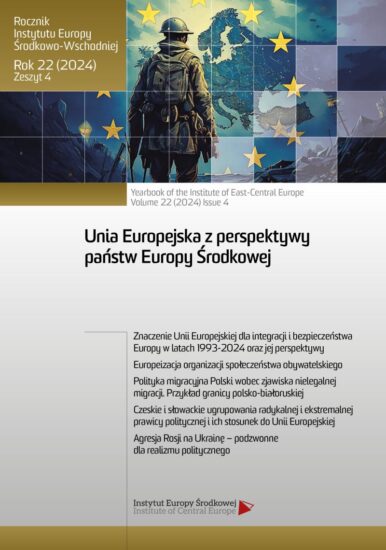Russia’s aggression towards Ukraine: a nell for political realism
ORCID: Jakub Olchowski: 0000-0002-7973-4263
Afiliacja: Uniwersytet Marii Curie-Skłodowskiej
Strony: 135-151
Wydanie: Lublin 2024
DOI: https://doi.org/10.36874/RIESW.2024.4.8
Sposób cytowania: J. Olchowski, Agresja Rosji na Ukrainę – podzwonne dla realizmu politycznego, „Rocznik Instytutu Europy Środkowo-Wschodniej” 22 (2024), z. 4: Unia Europejska z perspektywy państw Europy Środkowej, s. 135-151, DOI: https://doi.org/10.36874/RIESW.2024.4.8
Bibliografia:
1. Baluk W., Wyobrażenia Nowej Europy Wschodniej, „Wschód Europy. Studia Humanistyczno-Społeczne” 2016, nr 1.
2. Bugajski J., Państwo upadłe. Droga do rozpadu Rosji, Warszawa 2024.
3. Eitelhuber N., The Russian Bear: Russian Strategic Culture and What it Implies for the West, „Connections. The Quarterly Journal” 2009, vol. IX, no. 1.
4. Fukuyama F., A Country of Their Own. Liberalism Needs the Nation, „Foreign Affairs”, May/June 2022, https://www.foreignaffairs.com/articles/ukraine/2022-04-01/francis-fukuyama-liberalism-country.
5. Jones D. M. & Smith M. L. R., Return to Reason: Reviving Political Realism in Western Foreign Policy, „International Affairs” 2015, vol. 91, no. 5.
6. Kupiecki R., Konflikt zbrojny na Ukrainie a bezpieczeństwo europejskie, „Zeszyty Naukowe AON” 2015, nr 3.
7. Lachowski T., Stępniewski T., Russia’s War on Ukraine: Geopolitics, International Law, and Genocide, “Prace IEŚ” 2023, nr 10.
8. Mearsheimer J. J., Why the Ukraine Crisis Is the West’s Fault. The Liberal Delusions That Provoked Putin, „Foreign Affairs” 2014, http://www.foreignaffairs.com/articles/russia-fsu/2014-08-18/why-ukraine-crisis-west-s-fault.
9. Michta A. A., Europe’s New Fault Line in the East, [w:] Transatlantic Relations in a Changing European Security Environment, red. R. Kupiecki, A. A. Michta, Warsaw-Washington 2015.
10. Motyl A. J., America’s Leading ‘Realist’ Keeps Getting Russia Wrong, „The Hill” 2023, http://thehill.com/opinion/international/4079666-americas-leading-realist-keeps-getting-russia-wrong/.
11. Motyl A. J., The Surrealism of Realism: Misreading of the War in Ukraine, „World Affairs Journal” 2015, vol. 177, no. 5.
12. Motyl A. J., The Ukraine crisis according to John J. Mearsheimer: Impeccable Logic, Wrong Facts, http://europeanleadershipnetwork.org/commentary/the-ukraine-crisis-according-to-john-j-mearsheimer-impeccable-logic-wrong-facts/.
13. Olchowski J., Relacje Ukrainy z NATO – trudne partnerstwo, „Prace IEŚ” 2021, nr 6.
14. Piskorskaya, G., Strategii nepryamykh deystviy i «myagkoy sily» v informatsionnoy voyne Rossii protiv Ukrainy, „Wschód Europy” 2015, nr 1.
15. Sakwa R., ‘New Cold War’ or Twenty Years’ Crisis? Russia and International Politics, „International Affairs” 2008, vol. 84, no. 2.
16. Smalec Ł., Kultura strategiczna a paradygmat realistyczny. Krytyka, rywalizacja i perspektywy współpracy, „e-Politikon” 2012, nr 2.
17. Snyder T., Historian Timothy Snyder: Ukrainian Crisis Is Not About Ukraine, It’s About Europe, „Delfi”, 2015, http://www.delfi.lt/en/politics/historian-timothy-snyder-ukrainian-crisis-is-not-about-ukraine-it-s-about-europe-66368672.
18. Wojnowski M., Koncepcja wojny sieciowej Aleksandra Dugina jako narzędzie realizacji celów geopolitycznych Federacji Rosyjskiej, „Przegląd Bezpieczeństwa Wewnętrznego” 2017, nr 16.

PDF: Pobierz